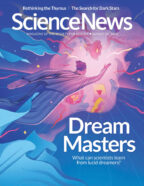Dream on
Lucid dreamers — people who are aware they’re dreaming while it’s happening — are helping scientists probe the sleeping mind in real time, Maria Temming reported in “Dispatches from the dreamscape” (SN: 8/26/23, p. 16).
Several readers shared their experiences lucid dreaming.
“I have been able to control a dream just about as successfully as a captain can control an oil tanker. I can steer the dream but not completely control it,” reader Peter Adams wrote. “I remember [my lucid dreams], and three have become the basis of science fiction stories I am writing.… I even dreamed a musical composition that I wrote down when I woke up. The music sounds rather good.”
Reader John wrote: “I have been a lucid dreamer all my life. I am now 71, and I remember most of my dreams. I learned years ago that I could control and even change the direction that a dream was going.… I control them like a movie director.… I once dreamed that I was water-skiing, even down to the surface tension of the water I was on. And the next day, I tried skiing for the first time and got right up the first try and felt that same sensation.”
Supplemental information?
Chemical analyses of 57 sports supplements revealed that only 11 percent contain an accurate amount of key ingredients advertised. Some of the supplements even contain compounds prohibited by the U.S. Food and Drug Administration, Meghan Rosen reported in “Supplements lack key ingredients” (SN: 8/26/23, p. 10).
Some readers asked why the story did not list the supplements studied.
Rosen also wondered which supplements were coming up short. But that information is not publicly available. “The researchers made an agreement with the lab they collaborated with to not make the names of the products they tested public,” Rosen says. “In the meantime, consumers’ best bet may be to look to third-party organizations that evaluate dietary supplements’ quality.”
Correction
In “The thymus isn’t so expendable after all” (SN: 8/26/23, p. 7), Science News wrote that over 12 percent of people who underwent a thymectomy developed an autoimmune disorder within five years after surgery, compared with about 8 percent of those who kept their thymus — a 1.5 times greater risk. It would have been more accurate to write that thymectomy patients have 1.5 times the risk of patients who kept their thymus.



